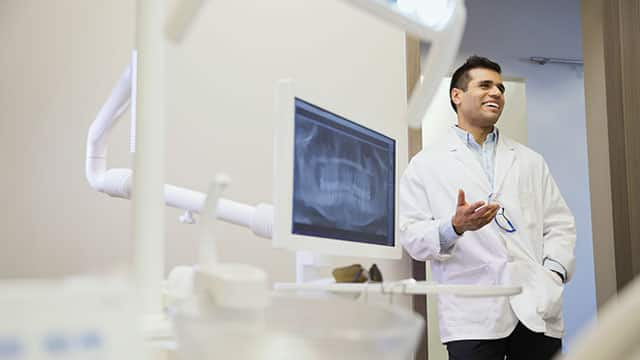What Is a Root Canal Treatment?
If you have severe tooth pain, it's possible that bacteria have invaded the inside chamber of your tooth, known as the dental pulp. If this is the case, you may need a root canal treatment to save the tooth, as the American Association of Endodontists (AAE) explains.
Root canals are often necessary after a tooth's nerve suffers damage, such as from:
- Deep cavities or fillings causing pulp irritation
- Cracked teeth
- Trauma to a tooth, which can be recent or from a past incident
Root canal treatment is a type of endodontic procedure where your dentist removes the tooth's pulp, which contains the nerves and blood supply of the tooth. After removing the damaged or dead tissue, your dentist will thoroughly disinfect, shape and fill the inside of the tooth to seal off any bacteria from reentering and causing an infection. If this treatment is not completed, over time, the tooth may develop a collection of pus underneath the gum, known as a dental abscess.
Dentists who are specialists in this treatment are called endodontists.
Why Would a Dentist Prescribe Antibiotics Before a Root Canal?
Giving a patient antibiotics before a dental treatment is known as antibiotic prophylaxis. For patients with certain conditions, this is recommended before undergoing dental treatment that poses a risk of bacteria entering the bloodstream. When oral bacteria enter the bloodstream, it can put patients with compromised health at risk of developing an infection elsewhere in the body.
The AAE considers it reasonable to administer prophylaxis for patients at risk of systemic disease prior to a dental procedure that involves the gums, the periapical region (roots) of teeth or the oral tissues. Because endodontists need to disinfect and use dental instruments around the roots of the teeth during a root canal, prophylaxis may be recommended to reduce the chance of introducing bacteria from inside the tooth to the bloodstream.
Protecting Against Infective Endocarditis
According to an article published in The Journal of the American Dental Association, dentists may recommend antibiotic prophylaxis for patients who are at risk of infective endocarditis (IE), which is an infection of the lining of the heart or heart valves.
According to the article, antibiotics might be given to individuals prior to dental treatment if they have:
- A history of IE
- A history of heart disease or a heart defect
- A prosthetic (fake) heart valve
- Received a heart valve repair that involved prosthetic materials
- Received a heart transplant that resulted in valve issues
Hearing about heart infections may make you wary of undergoing dental treatment — but know that these risks only involve a small number of individuals. If you have any worries, discuss them with your dental professional, who will assess you individually prior to completing any dental treatment and, if necessary, liaise with the appropriate medical professionals to plan your care safely.
Oral Care Center articles are reviewed by an oral health medical professional. This information is for educational purposes only. This content is not intended to be a substitute for professional medical advice, diagnosis or treatment. Always seek the advice of your dentist, physician or other qualified healthcare provider.
ORAL HEALTH QUIZ
What's behind your smile?
Take our Oral Health assessment to get the most from your oral care routine
ORAL HEALTH QUIZ
What's behind your smile?
Take our Oral Health assessment to get the most from your oral care routine















